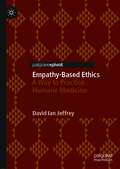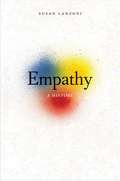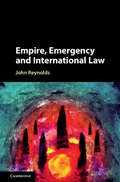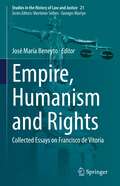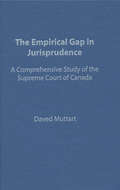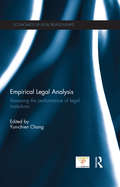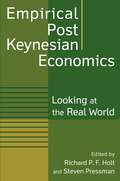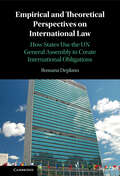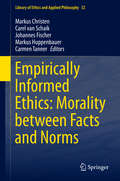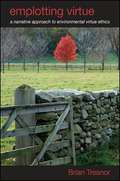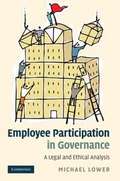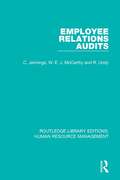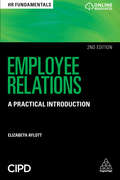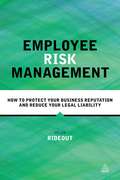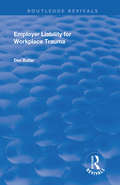- Table View
- List View
Empathy-Based Ethics: A Way to Practice Humane Medicine
by David Ian JeffreyThis book explores a new way of applying clinical ethics. Empathy-based ethics is based on the patient–doctor relationship and seeks to encourage a more humane form of medical practice. The author argues that the current emphasis on the biomedical model of medicine and a detached concern form of professionalism have damaged the patient–doctor relationship. He investigates examples of the dehumanization of patients and demonstrates a contrasting view of humane care. The book presents empathy as a relational construct - it provides an in-depth analysis of the process of empathizing. It discusses an empathy-based ethics approach underpinned by clinical examples of the practical application of this new approach. It suggests how empathy-based ethics can be embedded in clinical practice, medical education and research. The book concludes by examining the challenges in implementing such an approach and looks to a future which redresses the current imbalance between biomedical and psychosocial approaches to medicine.
Empathy: A History
by Susan LanzoniA surprising, sweeping, and deeply researched history of empathy—from late-nineteenth-century German aesthetics to mirror neurons†‹Empathy: A History tells the fascinating and largely unknown story of the first appearance of “empathy” in 1908 and tracks its shifting meanings over the following century. Despite empathy’s ubiquity today, few realize that it began as a translation of Einfühlung or “in-feeling” in German psychological aesthetics that described how spectators projected their own feelings and movements into objects of art and nature. Remarkably, this early conception of empathy transformed into its opposite over the ensuing decades. Social scientists and clinical psychologists refashioned empathy to require the deliberate putting aside of one’s feelings to more accurately understand another’s. By the end of World War II, interpersonal empathy entered the mainstream, appearing in advice columns, popular radio and TV, and later in public forums on civil rights. Even as neuroscientists continue to map the brain correlates of empathy, its many dimensions still elude strict scientific description. This meticulously researched book uncovers empathy’s historical layers, offering a rich portrait of the tension between the reach of one’s own imagination and the realities of others’ experiences.
Empire of Law: Nazi Germany, Exile Scholars and the Battle for the Future of Europe (Cambridge Studies in European Law and Policy)
by Kaius TuoriEuropean legal integration is often justified with reference to the inherent unity of European legal traditions that extend to ancient Rome. This book explores the invention of this tradition, tracing it to a group of legal scholars divided by the onslaught of Nazi terror and totalitarianism in Europe. As exiles in Britain and the US, its formulators worked to build bridges between the Continental and the Atlantic legal traditions, incorporating ideas such as rule of law, liberty and equality to the European heritage. Others joined the Nazi revolution, which promoted its own idea of European unity. At the end of World War Two, natural law and human rights were incorporated into the European project. The resulting narrative of Europe, one that outlined human rights, rule of law and equality, became consequently a unifying factor during the Cold War as the self-definition against the challenge of communism.
Empire, Emergency and International Law
by John ReynoldsWhat does it mean to say we live in a permanent state of emergency? What are the juridical, political and social underpinnings of that framing? Has international law played a role in producing or challenging the paradigm of normalised emergency? How should we understand the relationship between imperialism, race and emergency legal regimes? In addressing such questions, this book situates emergency doctrine in historical context. It illustrates some of the particular colonial lineages that have shaped the state of emergency, and emphasises that contemporary formations of emergency governance are often better understood not as new or exceptional, but as part of an ongoing historical constellation of racialised emergency politics. The book highlights the connections between emergency law and violence, and encourages alternative approaches to security discourse. It will appeal to scholars and students of international law, colonial history, postcolonialism and human rights, as well as policymakers and social justice advocates.
Empire, Humanism and Rights: Collected Essays on Francisco de Vitoria (Studies in the History of Law and Justice #21)
by José María BeneytoThis book deals with Vitoria, Charles V and Erasmus. Vitoria’s ideas had a major influence on Charles V and his European and American policy. In turn, Erasmus’ humanism was decisive in the formation of a new international order intellectually discussed by Vitoria and put into practice by the Emperor.Shedding new light on the influence of Francisco de Vitoria and Erasmus on Charles V’s imperial policy, the book’s goal is to explore the impact of Vitoria’s thought with regard to the history of, and contemporary issues in, international law, while also comparing his thinking with that of the well-known humanist Erasmus and assessing their respective influences on the imperial policy of Charles V.
Empirical Gap in Jurisprudence: A Comprehensive Study of the Supreme Court of Canada
by Daved MuttartIn jurisprudential writing, single decisions are often held up as representative without any evidence to support their representative claims. In order to address this problem, Daved Muttart has made a systematic study encompassing every judgment of the Supreme Court of Canada between 1950 and 2003.Examining almost 5000 cases, Muttart analyses these Supreme Court decisions employing several important criteria including whether the decisions overruled prior precedent, the extent to which they were decided on fact, law, or policy, and the legal and extra-legal modes of reasoning utilized by the Court. Muttart uses the results of this systematic examination to test the validity of extant jurisprudential theories. Ultimately, he concludes that the Court's method of operation is evolving as it moves into a new century. While the court's reasoning is becoming less foundational, it remains a predominantly legal, as opposed to political, institution.Filling an important niche in the study of jurisprudence, The Empirical Gap in Jurisprudence demonstrates that systematic studies based on large samples of cases will yield many insights that were obfuscated by prior efforts that relied on small and self-selected samples.
Empirical Legal Analysis: Assessing the performance of legal institutions (The Economics of Legal Relationships)
by Yun-Chien ChangThis innovative volume explores empirical legal issues around the world. While legal studies have traditionally been worked on and of letters and with a normative bent, in recent years quantitative methods have gained traction by offering a brand new perspective of understanding law. That is, legal scholars have started to crunch numbers, not letters, to tease out the effects of law on the regulated industries, citizens, or judges in reality. In this edited book, authors from leading institutions in the U.S., Europe, and Asia investigate legal issues in South Africa, Argentina, the U.S., Israel, Taiwan, and other countries. Using original data in a variety of statistical tools (from the most basic chi-square analysis to sophisticated two-stage least square regression models), contributors to this book look into the judicial behaviours in Taiwan and Israel, the determinants of constitutional judicial systems in 100 countries, and the effect of appellate court decisions on media competition. In addition, this book breaks new ground in informing important policy debates. Specifically, how long should we incarcerate criminals? Should the medical malpractice liability system be reformed? Do police reduce crime? Why is South Africa’s democratic transition viable? With solid data as evidence, this volume sheds new light on these issues from a road more and more frequently taken—what is known as "empirical legal studies/analysis." This book should be useful to students, practitioners and professors of law, economics and public policy in many countries who seek to understand their legal system from a different, and arguably more scientific, perspective.
Empirical Post Keynesian Economics: Looking at the Real World
by Steven Pressman Richard P HoltThis text highlights the major empirical questions and issues facing Post Keynesian economics today. Featuring contributions by leading Post Keynesian economists, it focuses on public policy and real-life analysis of this vibrant and dynamic economic theory. In language that is accessible to upper-level undergraduate and graduate students, professional economists, and public policy makers, each of the chapters takes on a specific issue of concern to all professional economists, provides empirical analysis of the issue, and then discusses the Post Keynesian view on the topic and contrasts it with the orthodox perspective. The topics covered are grouped into three main categories: empirical studies of consumption; empirical studies of business investment; and empirical studies of international economic relations.
Empirical Social Choice
by Wulf Gaertner Erik SchokkaertSince Aristotle, many different theories of distributive justice have been proposed, by philosophers as well as social scientists. The typical approach within social choice theory is to assess these theories in an axiomatic way - most of the time the reader is confronted with abstract reasoning and logical deductions. This book shows that empirical insights are necessary if one wants to apply any theory of justice in the real world. It does so by confronting the main theories of distributive justice with data from (mostly) questionnaire experiments. The book starts with an extensive discussion on why empirical social choice makes sense and how it should be done. It then presents various experimental results relating to theories of distributive justice, including the Rawlsian equity axiom, Harsanyi's version of utilitarianism, utilitarianism with a floor, responsibility-sensitive egalitarianism, the claims problem and fairness in health.
Empirical Views on European Gambling Law and Addiction
by Simon PlanzerThis book analyses the voluminous and meandering case law on gambling of the Court of Justice from an empirical perspective. It offers a comprehensive overview of the legal situation of gambling services in the EU Single Market. Additionally, the book presents the current state of research on gambling addiction. It then seeks to answer the central research question as to what extent the views of the Court of Justice on gambling find support in empirical evidence. The Court of Justice granted exceptionally wide discretion to the Member States due to a so-called 'peculiar nature' of games of chance. With the margin of appreciation having played a key role, the book inquires whether the Court of Justice followed the principles and criteria that normally steer the use of this doctrine. Noting the Court's special approach, the book elaborates on its causes and consequences. Throughout the book, the approach of the Court of Justice is contrasted with that of its sister court, the EFTA Court. Finally, the potential role of the precautionary principle and of EU fundamental rights in the area of gambling law is examined. Situated at the intersection of law and science, this book seeks to bridge the legal and scientific perspectives and the unique vocabularies common to each. It illustrates the direct relevance of science and empirical research for court cases and policy making. And it contrasts science-informed policy making with the on-going morality discourse on gambling.
Empirical and Theoretical Perspectives on International Law: How States Use the UN General Assembly to Create International Obligations
by Rossana DeplanoThe book examines the processes through which the resolutions adopted by the UN General Assembly acquire legal significance through state practice. By using an empirically-grounded method of inquiry, it examines how states attribute legal significance to resolutions in three different contexts: at the time of adoption, within domestic law and in international practice. The book shows that, contrary to the existent theories on the legal significance of resolutions, the General Assembly is not a unitary actor. It also demonstrates that the concept of legal significance of resolutions is not predetermined or static. While resolutions are often framed in normative language, they acquire legal significance only to the extent that states find it desirable or convenient, depending on context and circumstances. Consequently, the attribution of legal significance to resolutions turns out to be a manifestation of state will to abide by their content, not the will of the General Assembly.
Empirically Engaged Evolutionary Ethics (Synthese Library #437)
by Johan De Smedt Helen De CruzA growing body of evidence from the sciences suggests that our moral beliefs have an evolutionary basis. To explain how human morality evolved, some philosophers have called for the study of morality to be naturalized, i.e., to explain it in terms of natural causes by looking at its historical and biological origins. The present literature has focused on the link between evolution and moral realism: if our moral beliefs enhance fitness, does this mean they track moral truths? In spite of the growing empirical evidence, these discussions tend to remain high-level: the mere fact that morality has evolved is often deemed enough to decide questions in normative and meta-ethics. This volume starts from the assumption that the details about the evolution of morality do make a difference, and asks how. It presents original essays by authors from various disciplines, including philosophy, anthropology, developmental psychology, and primatology, who write in conversation with neuroscience, sociology, and cognitive psychology.
Empirically Informed Ethics: Morality between Facts and Norms
by Markus Christen Carel Van Schaik Johannes Fischer Markus Huppenbauer Carmen TannerThis volume provides an overview of the most recent developments in empirical investigations of morality and assesses their impact and importance for ethical thinking. It involves contributions of scholars both from philosophy, theology and empirical sciences with firm standings in their own disciplines, but an inclination to step across borders--in particular the one between the world of facts and the world of norms. Human morality is complex, and probably even messy--and this clean distinction becomes blurred whenever one looks more closely at the various components that enable and influence our moral actions and ethical orientations. In that way, morality may indeed be located between facts and norms--and an empirically informed ethics that is less concerned with analytical purity but immerses into this moral complexity may be an important step to make the contributions of ethics to this world more valuable and relevant.
Empirische Sozialforschung für die Polizei- und Verwaltungswissenschaften: Eine Einführung
by Stefan Hollenberg Claudia KaupEntscheidungen in Polizei, Politik und Verwaltung sollen adäquat theoretisch fundiert sein und auf einer soliden empirischen Basis gründen. Um diese Grundlagen zu entwickeln, sind Kenntnisse der wesentlichen Grundzüge empirischer Sozialforschung unverzichtbar. Dieses Lehrbuch bietet daher neben einer allgemeinen Einführung in die sozialwissenschaftliche Forschung praxisbezogene und beispielgestützte Hinweise für die Konzeption, Durchführung, Auswertung und Darstellung von zahlreichen quantitativen, qualitativen und mixed-methods- Ansätzen. Der Nutzen, aber auch Grenzen sozialwissenschaftlicher Forschung für die Polizei und die öffentliche Verwaltung wird in weiteren Kapiteln aufgezeigt.
Emplotting Virtue: A Narrative Approach to Environmental Virtue Ethics (SUNY series in Environmental Philosophy and Ethics)
by Brian TreanorDespite its ancient roots, virtue ethics has only recently been fully appreciated as a resource for environmental philosophy. Other approaches dominated by utilitarian and duty-based appeals for sacrifice and restraint have had little success in changing behavior, even to the extent that ecological concerns have been embraced. Our actions often do not align with our beliefs. Fundamental to virtue ethics is an acknowledgment that neither good ethical rules nor good intentions are effective absent the character required to bring them to fulfillment. Brian Treanor builds on recent work on virtue ethics in environmental philosophy, finding an important grounding in the narrative theory of philosophers like Paul Ricoeur and Richard Kearney. Character and ethical formation, Treanor argues, are intimately tied to our relationship with the narratives through which we view the human place in the natural world. By reframing environmental questions in terms of individual, social, and environmental narratives about flourishing, Emplotting Virtue offers a powerful vision of how we might remake our character so as to live more happily, more sustainably, and more virtuously in a diverse, beautiful, wondrous, and fragile world.
Employee Engagement in Corporate Social Responsibility
by Lonneke Roza Debbie Haski-Leventhal Stephen BrammerThis book offers a remarkable collection of chapters, written by the leading scholars in CSR and employee engagement. Using the existing literature, new empirical studies, case studies and thought-provoking insights, this collection of authors discuss why and how to engage employees in CSR and through CSR. Employee engagement in Corporate Social Responsibility focuses on engaging employees in socially responsible initiatives with three major parts of the book: the antecedents that lead to employee engagement in CSR; the processes and opportunities to involve employees; and the impact of the above on employees, the company, non-profit organisations and society. This book contributes to both research and managerial practice by presenting cutting edge knowledge from leading CSR scholars and practitioners.
Employee Engagement in Corporate Social Responsibility
by Lonneke Roza Debbie Haski-Leventhal Stephen BrammerThis book offers a remarkable collection of chapters, written by the leading scholars in CSR and employee engagement. Using the existing literature, new empirical studies, case studies and thought-provoking insights, this collection of authors discuss why and how to engage employees in CSR and through CSR. Employee engagement in Corporate Social Responsibility focuses on engaging employees in socially responsible initiatives with three major parts of the book: the antecedents that lead to employee engagement in CSR; the processes and opportunities to involve employees; and the impact of the above on employees, the company, non-profit organisations and society. This book contributes to both research and managerial practice by presenting cutting edge knowledge from leading CSR scholars and practitioners.
Employee Participation in Governance
by Michael LowerThe rights of the employee and the themes of employee ownership and participation have been central, recurring themes as the body of Catholic Social Thought has developed. There is now a unified corpus of official Catholic teaching that focuses the resources of moral theology and natural law theory on the important social issues of the day such as this. The description and explanation of the essential elements of Catholic Social Thought and its relationship to these themes helps the reader think about the place of the corporation in the economy and whether British and European corporate governance and labour law do what they should to put the employee at the centre of corporate governance.
Employee Relations Audits (Routledge Library Editions: Human Resource Management)
by C. Jennings W. E. McCarthy R. UndyThis book, first published in 1990, is a practical manual which presents guidance on how to carry out and evaluate an employee relations audit. This title also provides audits for five key areas of employee relations, including communication and consultation, equality of opportunity and disciplinary matters. This book should be of interest to lecturers, post-graduate students and practitioners of management, personnel, employee relations and industrial relations.
Employee Relations: A Practical Introduction (HR Fundamentals #2)
by Elizabeth AylottFostering positive relationships between employers and employees is crucial to ensure employee commitment and engagement, as well as overall business performance. Employee Relations is a practical guide to the principles and practice of employee relations in the workplace. Covering the key areas such as conflict and dispute resolution, dismissal and redundancies, rights and ethics, it equips you with the skills and knowledge you need to plan, implement and assess employee relations in any type of organization. Practical diagnostic tools and a variety of real-life examples from organizations including Amazon, HSBC and the UK Police Force are found throughout. This fully revised second edition of Employee Relations features new material on the gig economy, the virtual workplace, and recent legislation changes, and is more closely linked to the CIPD professions map. New online supporting resources include a series of templates, questionnaires and further tools to help evaluate and support the development of an effective employee relations strategy.HR Fundamentals is a series of succinct, practical guides for students and those in the early stages of their HR careers. They are endorsed by the Chartered Institute of Personnel and Development (CIPD), the UK professional body for HR and people development, which has over 145,000 members worldwide.
Employee Relations: A Practical Introduction (HR Fundamentals #23)
by Elizabeth AylottThe third edition of Employee Relations is a practical guide to the principles and practice of fostering positive relationships with employees to develop their engagement and achieve business success.It features updated material on recent legislation changes including employment status in the gig economy and deregulation as a result of new international relations. Covering key areas such as conflict and dispute resolution, redundancies, rights and ethics, this book equips you with the skills and knowledge to plan, build and assess employee relations in any type of organization. Practical diagnostic tools and real-life examples from organizations including HSBC show how these strategies can be applied in practice.With updated guidance and examples covering employee voice and the virtual workplace, Employee Relations is a vital resource for HR practitioners and students alike. Online resources include questionnaires and templates to support the development of an effective employee relations strategy.HR Fundamentals is a series of succinct, practical guides featuring exercises, examples and case studies. They are ideal for students and those in the early stages of their HR careers.
Employee Rights in Corporate Insolvency: A UK and US Perspective (Routledge Research in Corporate Law)
by Hamiisi Junior NsubugaThis book analyses corporate rescue laws, processes and policies prescribed in corporate insolvency or bankruptcy laws, and employment laws of the UK and the US, with a particular focus on how extant employee rights are treated when a debtor employer initiates corporate insolvency proceedings. The commencement of formal insolvency proceedings by an employer affects employees’ rights and interests. Employment laws seek to protect employees’ rights and interests, while insolvency laws seek to promote corporate rescue, which may entail workforce changes. Consequently, this creates a tension between whose interest insolvency law should give primacy of protection. The book analyses how corporate rescue processes such as administration, pre-pack business sales, company voluntary arrangements, receivership and liquidation impact employee rights and protection during corporate rescue proceedings in both jurisdictions. It goes on to address how the federal system of government in the US and the diffusion of power between federal and state law jurisdictions impact a uniform code of employee protection during Chapter 11 bankruptcy reorganisation proceedings. The book considers how an interpretative approach to law (Dworkin’s Interpretative Theory of Law) may be used to balance both employee protection and corporate rescue laws during corporate insolvency in the UK and the US. Of interest to academics, students and employment law practitioners, this book examines the tension between corporate rescue laws and employment protection laws during corporate insolvency in the US and the UK and how this tension may be remedied or balanced.
Employee Risk Management
by Helen RideoutEmployee Risk Management presents a straightforward, legally-grounded process that will enable employers to identify, manage and reduce the potential threats that come with every employee - as well as with anyone else who works for the organization, including contractors, volunteers, interns and temps. It covers everything from recruitment through to the end of the employment relationship. Readers will learn how to protect against threats as diverse as: managing employee social media use, an ageing workforce, remote working risks, data security and data protection.
Employer Branding for Competitive Advantage: Models and Implementation Strategies (ISSN)
by Shivani Agarwal Geeta Rana Ravindra SharmaThis book shows how to build and maintain a distinctive and credible employer brand and develop a set of relevant success metrics to help measure return on investment (ROI). Starting with the current interest in employer branding, this book looks at the historical roots of brand management and the practical steps to achieve employer brand management success.The book will review the pressures that have generated current interest in employer branding. It goes on to look at the historical roots of brand management and the practical steps necessary to achieve employer brand management success. The book includes the business case, research, positioning, implementation, management and measurement, and case studies of big-named employer brand stories.This book will provide new insights into the field of employer branding and provide directions and tools for organizational brand building. It will be beneficial for research scholars, engineers, practitioners, and management students.
Employer Liability for Workplace Trauma (Routledge Revivals)
by Des ButlerThis title was first published in 2002.This book offers an intriguing examination of the law concerning liability for psychiatric injury suffered by employees in the workplace. Included among these are employees confronting the risk of death or injury in the course of their normal employment, such as police or fire-fighters, those confronting death or injury out of their ordinary course of employment, such as accidents at work, and those possibly exposed to health-threatening circumstances, such as dust in the workplace. Also considered are employees who suffer mental health problems resulting from environmental factors, such as bullying, overwork and disciplinary measures. The amount of damages recovered in such actions can be substantial and this book examines the extent of the employer’s liability, as well as providing a psychiatric medicine perspective and a detailed analysis of the current state of the law in England, Wales and Australia.
